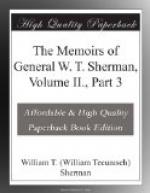The country of Middle Alabama, I learn, is teeming with supplies this year, which will be greatly to our advantage. I have no additional news to report from the direction of Florence. I am now convinced that the greater part of Beauregard’s army is near Florence and Tuscumbia, and that you will have at least a clear road before you for several days, and that your success will fully equal your expectations.
George H. Thomas, Major-General.
I answered simply: “Dispatch received—all right.” About that instant of time, some of our men burnt a bridge, which severed the telegraph-wire, and all communication with the rear ceased thenceforth.
As we rode on toward Atlanta that night, I remember the railroad-trains going to the rear with a furious speed; the engineers and the few men about the trains waving us an affectionate adieu. It surely was a strange event—two hostile armies marching in opposite directions, each in the full belief that it was achieving a final and conclusive result in a great war; and I was strongly inspired with the feeling that the movement on our part was a direct attack upon the rebel army and the rebel capital at Richmond, though a full thousand miles of hostile country intervened, and that, for better or worse, it would end the war.



